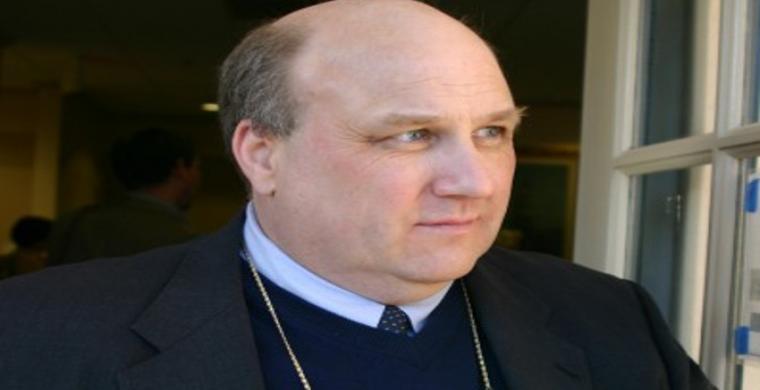Cranmer Scholar says God still Speaks to us through His Word
Archbishop Cranmer was a martyr, many follow in his footsteps today, says Dr. Null
David W. Virtue interviews the Rev. Canon Dr. Ashley Null
www.virtueonline.org
April 14, 2018
The Rev. Canon Dr. Ashley Null is an internationally respected scholar on the grace and gratitude theology of the English Reformation. He holds research degrees from Yale and an advanced degree B.D. from the University of Cambridge, and has received numerous awards for his work, including Fulbright, National Endowment for the Humanities and Guggenheim fellowships as well as being elected fellow of the Royal Historical Society and the Society of Antiquaries in London. He currently holds a research post funded by the German Research Council at Humboldt University of Berlin and is a visiting fellow at the Divinity Faculty of Cambridge University and St. John's College, Durham University. His project is editing the private theological notebooks of Thomas Cranmer, the author of the independent Church of England's founding formularies, for Oxford University Press. This is a five-volume project.
Dr. Null will be the guest speaker at the CANA East 2018 Synod being held this year at the Anglican Church of the Good Shepherd in Binghamton, NY. May 3-5. The title of his address is The Divine Allurement of God Archbishop Cranmer's Missional and Pastoral Principles for the 21st Century.
CANA East Bishop Julian Dobbs will officiate. Those wishing to attend may do so by registering at www.canaeast.com
VOL: What has an Archbishop (Cranmer) from the 16th century got to do with Christian mission and ministry today?
NULL: Our generation is not the first to have received the gospel; it is always helpful to see how God has used previous generations to help us understand what the important insights of Scripture are and how they can apply today. In the case of the Reformation, it was an extraordinary time where leading theologians reassessed what previous generations had understood to be the gospel against what the gospel said, and in the process, they recognized the heart of the human condition and God's response. The Reformers helped the Church to recover the importance and priority of what God does for us, rather than what we do for God.
VOL: You are considered the world's leading voice on Archbishop Cranmer. What are the three most important insights you have learned from your study of Cranmer?
NULL: God speaks to us through His word. 2. That this message of love, rather than fear, is what changes us. And 3. When we have been deeply touched by the unconditional love of God, we find the power and the desire to genuinely seek out ways to not only love God but our neighbors as well.
VOL: You have said, "Cranmer's record as archbishop has left no sign that power was important to him: what mattered was the furtherance of the Gospel as he conceived it." Is this a message that is relevant for Anglican ministers today?
NULL: It is relevant for everyone with a sin-sick human heart. Every one of us is tempted to use the gospel as a means to make us feel better about who we are, by denigrating those around us who we don't think we are as good as we are. We can use the very religion by which we are loved by God in our hearts to think less of those who do not believe as we do. Therefore, we all need to be reminded of the power of the gospel to makes us equal in needing to kneel at the cross.
VOL: What would Cranmer's message be to Archbishop Justin Welby (the current Archbishop of Canterbury)?
NULL: Never underestimate the power of the gospel to change human lives, nor to bring out anger and fear amongst those who do not want to be changed.
VOL: Cranmer had many enemies. How did he respond to those people who disagreed with him?
NULL: Cranmer practiced the evangelism of leniency. It infuriated his followers, but rather than use his power to punish those who undermined him, if they apologized even a little, he would do his best to promote them. When challenged by his assistants on this issue, he said in essence, "It's the goodness of God that leads us to repentance. Shall we do less for those who have not yet come to understand the power of the gospel?" In short, Cranmer believed that it was love and not fear that enabled people to come to Jesus. In his play Henry VIII, Shakespeare memorably depicted this popular understanding of Cranmer by having the king say, "Do my Lord of Canterbury a shrewd turn, and he is your friend forever." In the same play, Stephen Gardiner says about Cranmer, "words and weakness, words and weakness." Many people today agree with Gardiner that to show love and kindness to those who oppose and hurt you is weakness. Cranmer, however, thought he was following the clear biblical example of Jesus himself.
VOL: Archbishop Cranmer became a martyr for the faith. Do you see a time when Christians in England and America might be martyrs for the faith in the 21st Century?
NULL: Let's be honest, I have had the privilege of being with Anglicans around the world for whom persecution is a daily reality. So many of our fellow Christians today live with the realistic possibility of martyrdom. We don't have to wait for the future to see the Body of Christ suffering today.
VOL: Thank you Dr. Null














